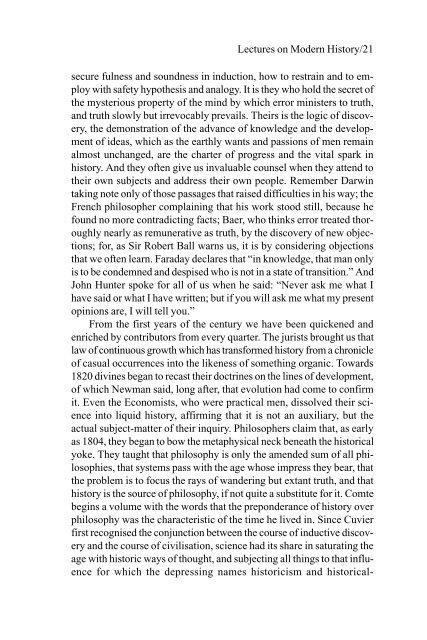Lectures on Modern History - Faculty of Social Sciences
Lectures on Modern History - Faculty of Social Sciences
Lectures on Modern History - Faculty of Social Sciences
You also want an ePaper? Increase the reach of your titles
YUMPU automatically turns print PDFs into web optimized ePapers that Google loves.
<str<strong>on</strong>g>Lectures</str<strong>on</strong>g> <strong>on</strong> <strong>Modern</strong> <strong>History</strong>/21secure fulness and soundness in inducti<strong>on</strong>, how to restrain and to employwith safety hypothesis and analogy. It is they who hold the secret <strong>of</strong>the mysterious property <strong>of</strong> the mind by which error ministers to truth,and truth slowly but irrevocably prevails. Theirs is the logic <strong>of</strong> discovery,the dem<strong>on</strong>strati<strong>on</strong> <strong>of</strong> the advance <strong>of</strong> knowledge and the development<strong>of</strong> ideas, which as the earthly wants and passi<strong>on</strong>s <strong>of</strong> men remainalmost unchanged, are the charter <strong>of</strong> progress and the vital spark inhistory. And they <strong>of</strong>ten give us invaluable counsel when they attend totheir own subjects and address their own people. Remember Darwintaking note <strong>on</strong>ly <strong>of</strong> those passages that raised difficulties in his way; theFrench philosopher complaining that his work stood still, because hefound no more c<strong>on</strong>tradicting facts; Baer, who thinks error treated thoroughlynearly as remunerative as truth, by the discovery <strong>of</strong> new objecti<strong>on</strong>s;for, as Sir Robert Ball warns us, it is by c<strong>on</strong>sidering objecti<strong>on</strong>sthat we <strong>of</strong>ten learn. Faraday declares that “in knowledge, that man <strong>on</strong>lyis to be c<strong>on</strong>demned and despised who is not in a state <strong>of</strong> transiti<strong>on</strong>.” AndJohn Hunter spoke for all <strong>of</strong> us when he said: “Never ask me what Ihave said or what I have written; but if you will ask me what my presentopini<strong>on</strong>s are, I will tell you.”From the first years <strong>of</strong> the century we have been quickened andenriched by c<strong>on</strong>tributors from every quarter. The jurists brought us thatlaw <strong>of</strong> c<strong>on</strong>tinuous growth which has transformed history from a chr<strong>on</strong>icle<strong>of</strong> casual occurrences into the likeness <strong>of</strong> something organic. Towards1820 divines began to recast their doctrines <strong>on</strong> the lines <strong>of</strong> development,<strong>of</strong> which Newman said, l<strong>on</strong>g after, that evoluti<strong>on</strong> had come to c<strong>on</strong>firmit. Even the Ec<strong>on</strong>omists, who were practical men, dissolved their scienceinto liquid history, affirming that it is not an auxiliary, but theactual subject-matter <strong>of</strong> their inquiry. Philosophers claim that, as earlyas 1804, they began to bow the metaphysical neck beneath the historicalyoke. They taught that philosophy is <strong>on</strong>ly the amended sum <strong>of</strong> all philosophies,that systems pass with the age whose impress they bear, thatthe problem is to focus the rays <strong>of</strong> wandering but extant truth, and thathistory is the source <strong>of</strong> philosophy, if not quite a substitute for it. Comtebegins a volume with the words that the prep<strong>on</strong>derance <strong>of</strong> history overphilosophy was the characteristic <strong>of</strong> the time he lived in. Since Cuvierfirst recognised the c<strong>on</strong>juncti<strong>on</strong> between the course <strong>of</strong> inductive discoveryand the course <strong>of</strong> civilisati<strong>on</strong>, science had its share in saturating theage with historic ways <strong>of</strong> thought, and subjecting all things to that influencefor which the depressing names historicism and historical-
















